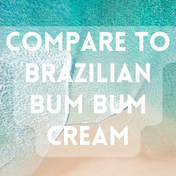Difficulty: ★★★
Any specialty products used (such as fragrances, colourants and glitter) are from our Fizz Fairy website and are linked to be found and purchased through the site.

Solid Bubble Bath Pie Recipe
Yield: 8 x 8oz pies
Ingredients:
- 25 oz Baking Soda
- 7 oz Citric Acid
- 2.5 oz Cream of Tartar
- 13 oz SLSA
- 4.5 oz Deodorized Cocoa Butter
- 6 oz Shea Butter
- 0.5 oz Polysorbate 80
- 1.5 oz Liquid Glycerin
- 0.8 oz Blueberry Cobbler Fragrance Oil*
- 4 tsp. Fine Satin Gold Shimmer Mica
- 4 tsp. Blue Suede Shoes Mica
- 2 tsp. Brown Bronze Mica
- 2 tsp. Dark Bronze Holographic Eco Glitter
- *0.8 oz Vanilla Stabilizer (if using Blueberry Cobbler or another fragrance oil with high vanillin content)
Equipment:
- Scale
- Large Microwavable Bowls
- Measuring Cup (or other heat-safe container)
- Measuring Spoons
- Wax/Parchment Paper
- Microwave
- Spoons for mixing
- Whisk
- Fork
- Knife
- Miniature Pie Tins (mine are 3" across the top, purchased at the grocery store)
- A cookie cutter or bowl that is about 2cm larger than your pie tins
- Safety Equipment (Gloves, Protective Eyewear, Mask)
- Optional but handy: Thermometer
Instructions:
1. In a small heat-safe container, you want to add your shea butter, and deodorized cocoa butter. It's best to cut your butters up into smaller chunks ahead of time, so that they melt more quickly and evenly. Place the container in the microwave to melt the butters using 30-60 bursts. The cocoa butter can take a little while to melt. Be careful when removing it from the microwave, as it may be very hot! I tend to take mine out even if the cocoa butter hasn't melted completely, as it will continue to melt after it's removed from the microwave.

2. While your butters are melting, you can add your dry ingredients to a large mixing bowl. Combine your baking soda, citric acid and cream of tartar. Mix these ingredients using a whisk or gloved hands, breaking apart any clumps of baking soda as you mix. Alternatively, you can add these ingredients to the bowl through a metal sifter, to ensure there will be no clumps in your mix.

3. Very carefully, add your SLSA to the mixing bowl. Add the SLSA very slowly and gently, as it is very fine and powdery, and it can become airborne very easily. You will want to wear a mask during this step to avoid breathing in any SLSA. While it isn’t dangerous, it is irritating to the throat and can make you cough. Then you can slowly mix the SLSA together with the other dry ingredients, again using a whisk or gloved hands.
4. To your melted butters, you can now add the glycerin, polysorbate 80, and fragrance oil. If you are using a fragrance oil with a high vanillin content, such as the Blueberry Cobbler fragrance oil we used here, you will want to add your vanilla stabilizer at this point as well. Mix well.

5. Now add about ⅓ of the melted butter mixture to your dry ingredients. The hotter the liquid ingredients are when added, the softer the final “dough” will be, and potentially be harder to work with as well. I like to add my butters at about 170°F, and allow them to cool first if they're any hotter than this. Use your hands to incorporate the wet and dry ingredients together. Continue adding 1/3 of the melted butter mixture and mixing until everything is fully incorporated and combined.
The final texture will be very similar to bread dough – soft, workable, and slightly sticky. The texture of the mixture depends on the temperature of the butters. The warmer the dough, the softer it will be. I find a dough temperature of about 85-100°F to be a great moldable texture, be it for making bubble scoops are another solid bubble bath variant. Later, if your dough becomes too cool to work with, you can place the entire mixture into the microwave for 10-15 seconds to warm it.

6.) We will now separate our mix evenly into two bowls to create two colours. This amounts to about ___ per bowl. In the first bowl, I added 3 tsp. of our fine satin gold shimmer mica, and 1 tsp of our brown bronze mica. In the second bowl, I added 3 tspn of our blue suede shoes mica. Mix each of these bowls using gloved hands until the mica is fully incorporated and your dough is thoroughly coloured.


8.) Cut out some ~6"x6" squares out of your wax paper. We will use these to make our "crusts" on. I find them handy as they allow us to move the crusts around, and we can also quickly microwave them if they become too cool and hard to work with.
9.) Take a small handful of dough and flatten it out onto a wax square. You want it to be just larger than your cookie cutter or small shape you'll be using to "cut-out" your round crust.

10.) Use your cookie cutter or small cutter to press into the dough and create your crust. Use your finger to clean around the edge. Then, hold the wax paper down while you lift up the bowl, revealing your first crust! You can make a couple of these at a time, but I don't like to make more than 3 as they can start to dry more quickly than the dough in the bowl, and you can run into problems as it cracks and doesn't mould as nicely to the tin.


11.) Next, flip your crust on the wax paper onto a tin. You should be able to gently peel the wax paper away from the crust. If it doesn't peel away easily, your dough may be too warm and you should give it some time to cool down. If it cracks, you can try warming it on the wax square for 10 seconds in the microwave to help soften it. If it doesn't come out perfectly - that's okay! You can mould the dough more while it's in the tin, and add in additional dough to fill any cracks or small holes.


12.) Now you can add some blue filling to your pie. I use my hands to ensure the bottom is totally filled, and then create a bit of a mound to simulate a real pie with filling.

13.) You can now make the top crust using the exact same process from step 10, flipping the crust onto the pie and pulling the wax paper away. I like to gently press down around the edges to make sure my crusts are stuck together, pull or cut away any excess crust, and just mould them a bit with my hands to ensure the crusts aren't digging in around the pie tin, but are pulled-up for easy release.


14.) Next, you can use a fork and knife to make the details on your pie. You can use the fork to make a beautiful edge around the pie, and a knife to create slits in the top of it.


15.) Repeat the process with your remaining dough! This recipe tends to create. 8 pies with my small tins. You want to allow these to dry overnight before painting them.
16.) The following day, I like to paint my bubble bath pies to make them look even more realistic and detailed. I do this the same way I would paint a bath bomb, using mica mixed with isopropyl alcohol. If you would like some tips or additional information on how I do this, you can check our my 10 Bath Bomb Painting Tips Blog Post. I use the same fine satin shimmer gold mica to gently wash over the crusts, and the brown bronze mica to make certain parts of the edges look a little more baked and crispy. While they're still wet, I add some bronze holographic eco glitter for a little cinnamon-like shimmer, and then I paint with some of the blue suede shoes mica in the slits on the tops of the pies. You can feel free to experiment here, depending on the type of pie you're making and how baked you want it to appear! Try to think of where a pie would naturally bake a little darker, such as around the edges and on the top.


17.) Allow your painted pies to sit for another 24 hours before packaging them to gift or sell. These look great in little kraft boxes, reminiscent of a pie box in the fall!

These pies can be used for 2-4 baths, depending on preference. I instruct customers to cut up their pie into a crumble beforehand, and store it in an air-tight bag or container, so that it's ready to use when they bathe. When they want to use some of their pie, they can place some of the crumble into a metal strainer which can then be held under the faucet for a luxurious, frothy bath. These pies have a shelf life of about a year, if stored in a cool, dark location. Enjoy!
However you choose to recreate this recipe is up to you - there are so many incredible choices to make when it comes to these! If you do try this recipe, make sure you tag us so we can adore and share your creations! Please leave any comments or questions below and thanks for reading!
- Lindsay at Fizz Fairy
____________________________________
*All of the above content is original and belongs to Fizz Fairy Inc. If you would like to use any of this content, we ask that you please give us credit!*


